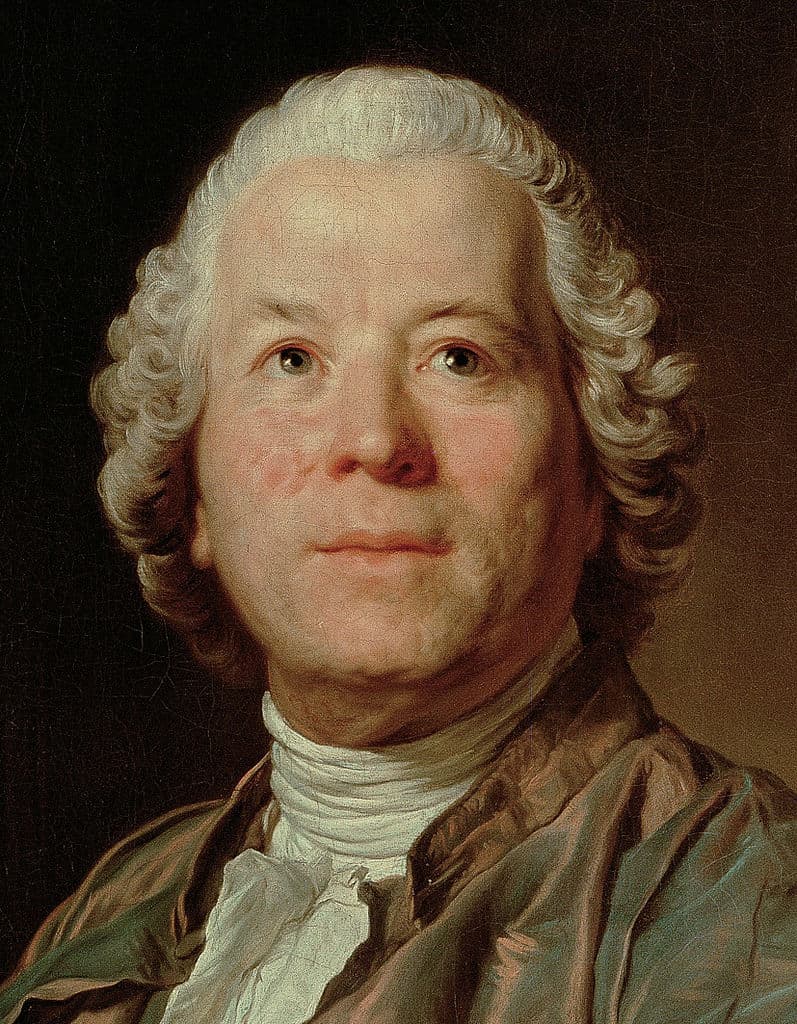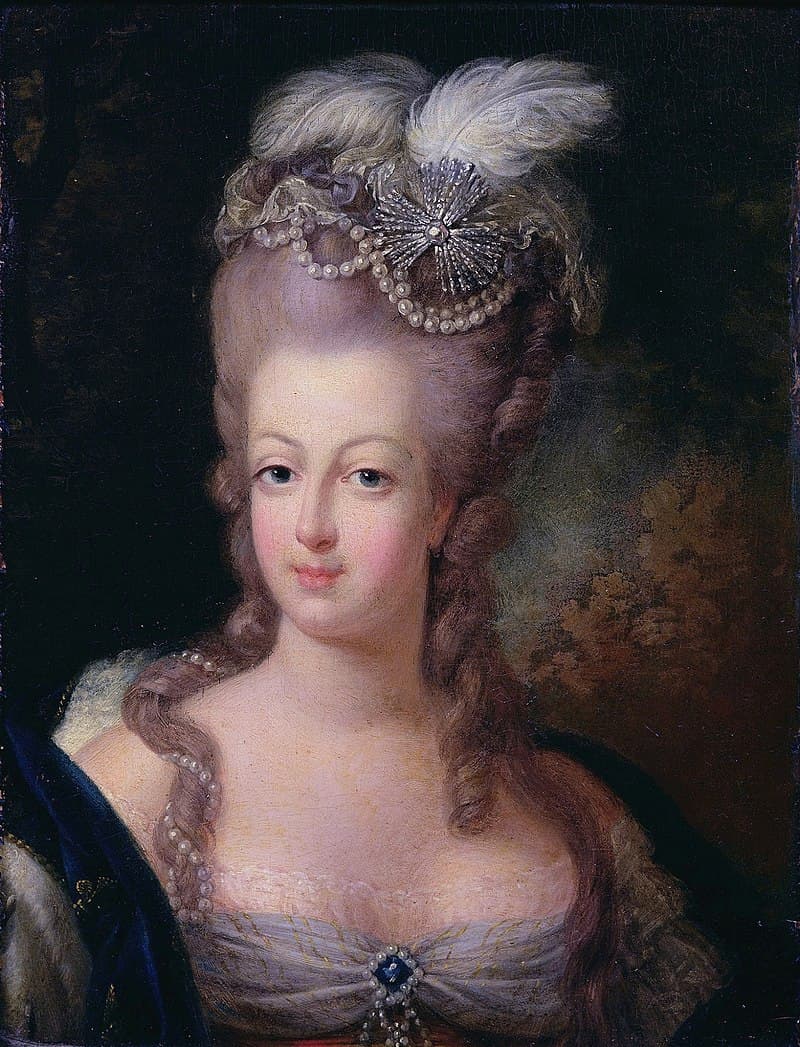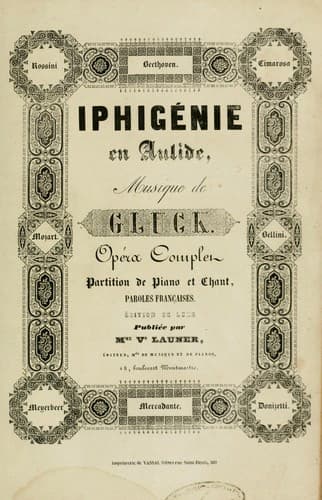Christoph Willibald Gluck (1714-1787), working at the Habsburg court in Vienna and at the Parisian stage, completely reformed operatic traditions. At a time when virtuoso singers dominated the operatic stage, Gluck set out to return opera to its origins by focusing on human drama and passions. Giving equal importance to words and music, he denied operatic superstars the opportunity for vocal improvisation and virtuosic displays.

Christoph Willibald Gluck
It goes without saying that Gluck made some powerful enemies along the way. Rejecting artistic superficiality, Gluck aspired to beautiful simplicity and he intimately molded music to the drama with recitatives, arias, and choruses intermingled in large unified scenes. Amalgamating Italian melodic grace, German seriousness, and the stately magnificence of the French tragédie lyrique, he composed operas that “avoided a display of difficulty at the expense of clarity.” Gluck’s career climaxed with the Paris production of Iphigénie en Aulide, premiered on 19 April 1774 by the Paris Opéra in the second Salle du Palais-Royal.
Christoph Willibald Gluck: Iphigénie en Aulide “Overture”
Iphigénie en Aulide was the first of seven operas that Gluck composed for Paris. Gluck had originally set the libretto by Marie François Louis Gand Leblanc, and Bailli du Roullet after Jean Racine’s Iphigénie en Aulide in the early 1770s. Gluck had embarked on this project with no certainty of production, but he was inspired by an Italian opera company that enjoyed spectacular successes on the Parisian stage with performances of Italian comic opera. Partisans of Italian opera suggested that the French language was inherently unsuitable for singing and concluded, “that the French have no music and cannot have any.”

Iphigénie en Aulide
Gluck opportunistically presented himself as wanting to prove that a good opera could be written to French words, and he set out to compose “a noble, sensitive, and natural music suited for all nations, so as to abolish the ridiculous distinctions of national styles.” He sent the finished opera to the French Embassy in Vienna, and diplomatic letters were penned to the Académie Royale and the French press. Initially, there were some hesitations, as it was feared that Iphigénie en Aulide would drive existing French operas off the stage.
Christoph Willibald Gluck: Iphigénie en Aulide – Act II Scene 1: Rassurez-vous, belle princesse … Vous essayez en vain de bannir mes alarmes (Lynne Dawson, soprano; Monteverdi Choir; Lyon National Opera Orchestra; John Eliot Gardiner, cond.)
Christoph Willibald Gluck: Iphigénie en Aulide – Act II Scene 1: Par la crainte et par l’esperance (Lynne Dawson, soprano; Lyon National Opera Orchestra; John Eliot Gardiner, cond.)
Gluck was convinced that his work could be fully effective only if he himself was present and supervised everything on the spot, from the rehearsals to the first performances. With support from his former vocal student Marie Antoinette, Gluck arrived in Paris in 1773, and after six months of rehearsals, Iphigénie en Aulide finally reached the stage.

Marie Antoinette
The action takes place before the Trojan War, when Agamemnon gathers the Greek armies at the port of Aulis. The goddess Diane sent unfavorable winds to prevent the Greeks from sailing, and the oracle tells Agamemnon that he has to sacrifice his own daughter Iphigénie in order to destroy an innocent country. Agamemnon is torn and summons his daughter to Aulis to marry the great hero Achilles. Remembering that he is supposed to sacrifice her, he tries to prevent her from coming by suggesting that Achilles has been unfaithful. However, Iphigénie and her mother Clytemnestra have already arrived, and with the impending wedding ceremony, Agamemnon’s guard reveals that the king is awaiting his daughter before the altar in order to kill her. Iphigénie resigns herself to her fate and offers her life for the sake of her people, but Achilles rushes in with his warriors and announces that Diana has changed her mind about the sacrifice.
Christoph Willibald Gluck: Iphigénie en Aulide – Act III Scene 3: Adieu, conservez dans votre ame (Lynne Dawson, soprano; Lyon National Opera Orchestra; John Eliot Gardiner, cond.)
Christoph Willibald Gluck: Iphigénie en Aulide – Act III Scene 3: Calchas, d’un trait mortel perce (John Aler, tenor; Lyon National Opera Orchestra; John Eliot Gardiner, cond.)

Iphigénie en Aulide, 1842 edition
Iphigénie was a tremendous success, as it beautifully balanced the dramatic and musical interests of opera. On the day of the premiere, enormous crowds pushed against the ticket booths, and the opera house had to triple the guards to keep order. The hall was packed, and all the court was present, except the King and Mme du Barry. And it was reported that Marie-Antoinette clapped her hands throughout, and the court was obliged to do likewise. Marie-Antoinette wrote to her sister Maria Christine Josepha a week later, “On the 19th we had the first performance of Iphigénie: I was carried away by it, and people can no longer talk of anything else. All heads are fermenting as a result of this event, as much as could possibly be imagined – it is incredible, there are dissensions and quarrels, as though it were a matter of some religious dispute; at court, although I publicly expressed myself in favour of this inspired work, there are partisanships and debates of a particular liveliness; and in town, it seems to be worse still…” Gluck’s influence carried well into the nineteenth century as Richard Wagner produced a German version in 1847, predictably with significant alterations.
For more of the best in classical music, sign up to our E-Newsletter
Christoph Willibald Gluck: Iphigénie en Aulide
